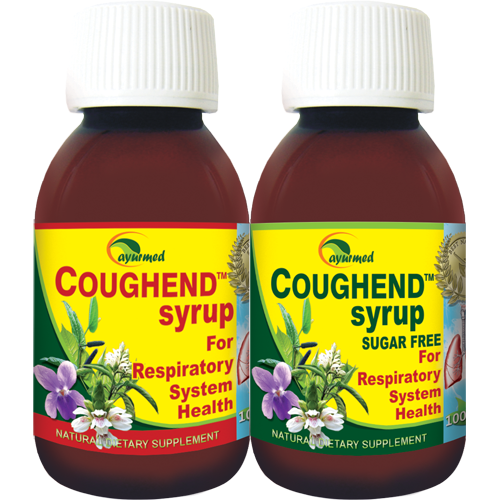The natural dietary supplement COUGHEND syrup is a natural product formulated from Indian medicinal herbs, which support the respiratory tract health and contribute to its decongestion by maintaining the fluidity of mucus and sustaining the elimination of mucus in case of productive cough and soothe the reflex act of cough in case of dry cough. By relieving cough, it helps reduce dryness and irritation of the respiratory tract.The properties of bioactive substances of herb extracts contained in COUGHEND syrup help maintain the body’s natural capacity for self-defense and adaptation to environmental conditions. COUGHEND syrup can be administered throughout the cold season as the phytonutrients of herbs contribute to the body’s natural self-defense and adaptation to environmental conditions.
COUGHEND Syrup contributes to:
- maintain the health of the respiratory system;
- fluidify bronchial secretions and their elimination, reducing dryness and irritation of throat and bronchi, diminish all forms of cough and their associated unpleasant effects;
- facilitate the respiratory process by decongesting the airways, complementary in asthma therapy (as bronchodilator);
- maintain the body’s natural capacity for self-defense and its adaptation to environmental conditions.
Method of administration and recommended dosage:
As dietary supplement, 30 min. before meals or one hour after meals.
Children: 1-3 years: take ½ (half) teaspoon (2.5ml) two times per day;
Children above 3 years: take 1 (one) teaspoon (5ml) two times per day;
Adults: take 1 to 2 (one to two ) teaspoons (5-10ml) two to three times a day.
Attention: This product is not intended to diagnose, treat, cure, or prevent any disease. Do not exceed the recommended dose. The dietary supplements should not be used as a substitute for a balanced and varied diet. Pregnant or lactating women or individual with a known medical condition should consult their healthcare professional prior to taking this product or any dietary supplement. Keep out of the reach of children. Store in a cool and dry place. Do not use this product if the seal around cap is missing or broken. To be consumed with in 60 days after the first opening of the product. For persons with diabetes condition COUGHEND sugar free syrup is advised.
- Pistacia integerrima (Kakar singhi), aerial parts (4:1)-150 mg;
- Adhatoda vasica (Vasa), leaves (3:1)-150 mg;
- Piper longum (Pipli, Java pepper), fruits (3:1)-75 mg;
- Cyperus rotundus (Nagarmotha), rhizome (6:1)-75 mg;
- Ocimum sanctum (Holy basil) aerial parts (5:1)-75 mg;
- Glycyrrhiza glabra (Licorice), roots (5:1)-75 mg;
- Zingiber officinale (Ginger), rhizome (6:1)-75 mg;
- Abies webbiana (Talispatra), leaves (8:1)-75 mg;
- Solanum xanthocarpum (Kantakari), aerial parts (5:1)-75 mg;
- Cinnamomum zeylanicum (Cinnamon), bark (10:1)-75 mg;
- Piper nigrum (Black pepper), fruits (6:1)-75 mg;
- Viola odorata (English violet), aerial parts (5:1)-75 mg;
- Sarcostemma brevistigma (Somlata), aerial parts (5:1) -75 mg;
- Sodium borate-65 mg;
- Mentha piperita (Mint), aerial parts (4:1)-25 mg;
- Cinnamomum camphora (Camphor), bark (15:1)-24 mg;
- Sodium benzoate (preservative)-25 mg;
- Sugar-2400 mg;
- Sorbitol (70%)- 3000mg (only for Coughend Syrup Sugar free);
- Demineralized water – up to 5 ml.
- Pistacia integerrima (Kakar singhi) – has expectorant properties being adjuvant in asthma, coughs and other respiratory problems. Supports the digestive system. It is a herb recommended in conditions of emaciation and malnutrition.
- Adhatoda vasica (Vasa) – helps relax tracheal muscles, acts as a bronchodilator and helps protect against bronchospasm caused by histamine. It contributes to fluidify the secretions, promoting the health of upper respiratory tract.
- Cyperus rotundus (Nagarmotha) – rhizome contains active substances that have astringent, diaphoretic, analgesic, antispasmodic, carminative, antitussive and sedative effects. It has antibacterial properties against pathogens that usually cause infections in upper and lower respiratory tract.
- Ocimum sanctum (Holy basil) – extract of aerial parts of the herb generally contributes to the respiratory health, sustains pulmonary functions. It is one of the main herbs which due to its bronchodilator, expectorant, anti-allergic and anti-inflammatory effects, used in case of cough and cold. It is beneficial in respiratory problems because of it’s content of active substances in the essential oil, which alleviate respiratory congestion.
- Glycyrrhiza glabra (Licorice) – licorice root favors in maintaining health of respiratory system mucosa, helps the fluidization of tracheobronchial and pharyngeal secretion as well as soothes the irritation of respiratory tract mucosa. It is beneficial in problems of the upper respiratory tract, accompanied by inflammatory conditions, especially in children and elderly. Licorice is very useful in dry and productive coughs.
- Zingiber officinale (Ginger) – rhizome contains essential oil which is especially effective in productive cough (facilitates expectoration) and allergic respiratory problems such as asthma. Decongests the upper nasal passages, moistens throat mucosa. Ginger helps in cold and flu by its diaphoretic action.
- Abies webbiana (Talispatra) – leaf extract contains active principles which have bronchodilator and anti-inflammatory actions, thus, useful in chronic respiratory problems, coughs and colds. Active principles decrease secretion of mucus and improve breathing.
- Solanum xanthocarpum (Kantakari) – powder from the aerial parts of herb has antitussive action in the nonspecific cough and bronchial asthma by reducing the release of histamine in the lungs. The herb is useful in fever, cough, asthma.
- Sarcostemma brevistigma (Somlata) – maintains a healthy respiratory system by its energizing, antihistaminic, antispasmodic, expectorant, immunostimulant effects.
- Viola odorata (English violet) – the herb has been used since a long time in colds and flu, as it helps in faster recovery of respiratory system by removing infections. Also, it is used in case of excess mucus, cough, asthma, headaches.
- Mentha piperita (Mint) – mint extract helps remove the excess mucus, whereas menthol is a powerful decongestant, at the same time regulates body temperature in case of fever. In case of asthma, thymol-one of the compounds of mint acts as a natural cough suppressant.





